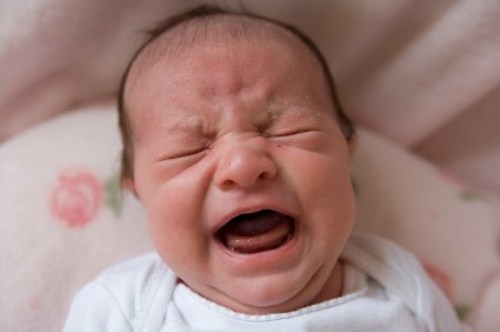Are you a new parent being worried because your baby cries when pooping? There might be a problem if baby cries in an inconsolable and high pitched sound, in which case you need to consult the pediatrician. However, most of the times, babies cry because they are unfamiliar with the new sensations when pooping. Remember that an unborn baby relies on the mother’s system for everything, including excretion. But upon birth, the baby has to eat, poop and react to the surrounding environment. So the next time your baby cries, groans or makes some funny faces when pooping, don’t cry along.

Why Does Baby Cry When Pooping?
1. Developing Body
Pooping is a hard task for a baby whose body is still developing. Remember that even an adult needs to make efforts when pooping so that there is proper coordination between the various muscles involved in bowel movement. This is not the case with a baby whose coordination is still developing. When the pooping sensation comes, the baby cannot get into a comfortable position but struggles to poop in the current posture. This can be the reason why baby cries when pooping.
2. Constipation
Constipation can cause baby to cry when pooping due to the inability to pass stool with ease. You will know that your baby could be having constipation if baby strains and cries when pooping, passes small balls of stool that is dry and firm, has fewer than one bowel movement in a week if breastfeeding, or less than one bowel movement in three days if bottle-feeding. Baby constipation results from insufficient fluid intake. Remedy this by increasing baby’s water intake. For older babies, give them some fresh fruit juice, and for the babies who already start taking solid food, increase fiber-rich foods such as spinach, plums and pears. If this does not help, consult the pediatrician without delay.
3. Excess Gas
Excess gas in the baby’s bowel can be the reason why baby cries when pooping. Excess gas can occur when baby gulps excessive air when crying or feeding, is unable to digest some ingredients in what she/he eats. Gas pain can also be caused by infection in the gastro-intestinal system. To relieve excess gas from baby’s bowels, you can burp baby after feeding. Gently massage baby’s stomach to aid the release of excess air. You can also give baby some anise water or a few drops of dilute sugar solution.
Other Possible Reasons for Babies' Cries
If you cannot yet understand the reasons for the crying of your baby, here are some tips to help you figure it out:
1. Being Hungry
Besides crying, look for other signs that your baby is hungry, including sucking on things. Babies generally eat every two to three hours and two to four ounces make a full meal, depending on age and size. For a breastfed infant, this is equivalent to 40 minutes of feeding and 10 minutes for an older baby.
2. Wet Diaper
Check if your baby’s crying is due to a wet or soiled diaper. Some infants will begin crying the moment they feel a little wetness in their diapers.
3. Being Tired
Most babies sleep following every feeding session and for about 16 hours a day. Signs that your baby could be tired include rubbing eyes, yawning and fussiness. It’s a good practice to soothe and comfort your baby periodically.
4. Being Overdressed
Overdressing a baby can lead to overheating and discomfort. The general rule is to dress your baby in one more layer of clothing than an adult. To check whether your baby is overheated, touch her ear and if it feels too hot, reduce the clothing. If it feels too cold, add a layer of clothing. If your baby is feverish, check the temperature and consult a doctor if the thermometer reading is above 100.4 °F.
5. Over Stimulation
If you have kept your baby busy with activity or attention for too long, this could be the reason for the crying. Take the baby to rest in a quiet and dark room. You can also calm the baby by soothing, swaddling, swinging, shushing, and side-lying.
6. Pain
Another reason baby cries when pooping is pain. This may be caused by a fingernail or toenail pinching the body, diaper rash or a string trapped around a finger or toe. Look out for such causes of pain and if you find nothing and the baby continues to cry inconsolably, consult your doctor or a pediatrician.
7. Heartburn
A baby can cry due to heartburn, otherwise known as gastrointestinal reflux (GER). If a baby throws up a little milk after feeding, it can cause some pain, but this is normal. However, when this happens too regularly, it may affect baby’s growth. Burp your baby when feeding and then maintain the baby’s head in an elevated position for 30 to 60 minutes after feeding.
8. Seeking Attention
Your baby may be seeking attention by crying. This is most common during the first three months. This is the case if crying stops when you pick the baby and starts again once you put your baby down. Whenever possible, hold and cuddle your baby especially during the first few months. This will even help the baby to sleep better at night.
9. Colic
If baby cries when and long after pooping, colic could be the reason. Colic is unexplained crying that goes on for up to two to three hours at a time, for about three days in a week. It usually begins when babies are about three weeks old and happens at around the same time of day, usually at night. Colic will normally stop by the time babies are three to four months old.
